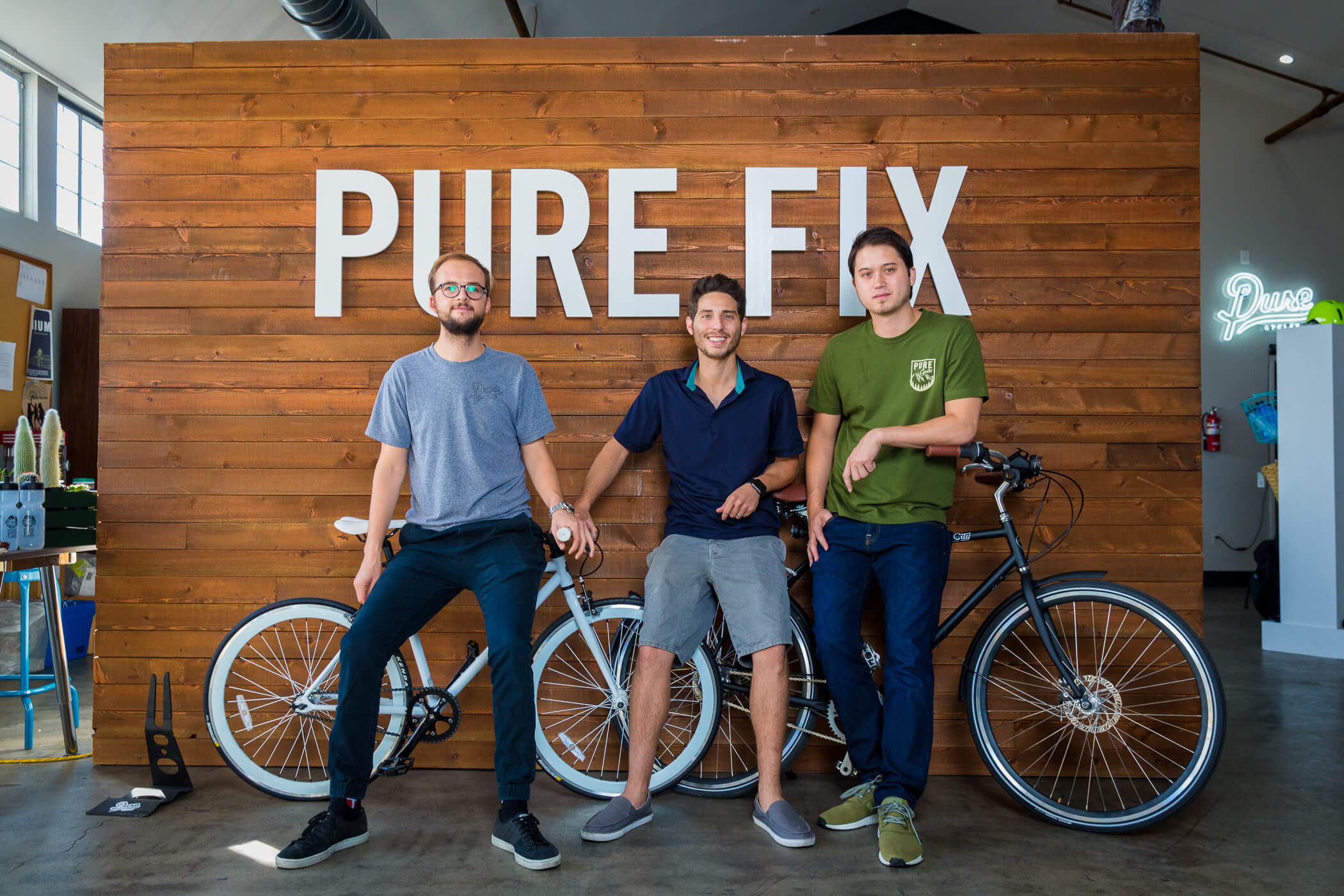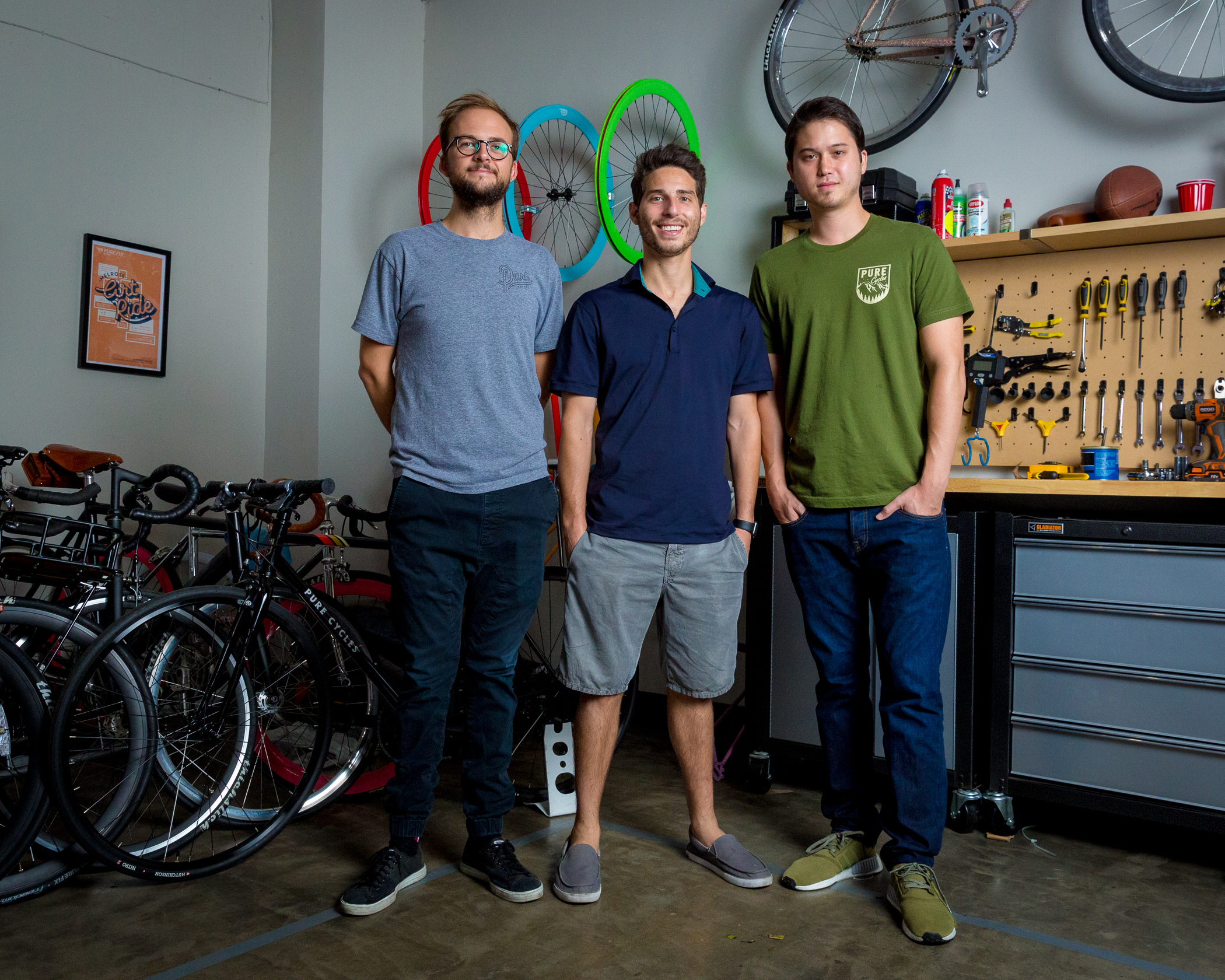By Jim Newberry
What’s more exciting than flying down the street on your bike, wind blowing through your hair? For the guys at Pure Cycles, it’s designing and selling that bike. They’re bent on producing a fun and beautiful product that even the most inexperienced biker would be comfortable shopping for and riding.
Los Angeles Photographer Jim Newberry stopped by to take a few photos and get to know the young entrepreneurs—Jordan Schau, Michael Fishman and Austin Stoffers—behind the Burbank, Calif., business.

We noticed that once we started the bike conversation with ‘Which color do you like?’ instead of ‘Which component do you want?’ we were able to better connect with customers.
Jim Newberry: Why did you decide on bicycles to build a business around?
Pure Cycles: We were seniors in college at University of Wisconsin-Madison and we saw that most college students were riding really old, used bikes and that if you wanted to buy a new, high-quality bike then you would have to spend $600+ and your only color options would be black, silver or white. We set out with a plan to build the perfect college bike that cost less than $300 and came in very colorful colors.
We built a very simple bike that would be something we would want to ride. It was important for us to build a bike that required little to no maintenance, that came in a lot of different colors and allowed for a lot of customization and personalization, and that was very affordable.
We were also really excited about building a business around bikes because we loved riding bikes growing up and were able to re-connect with bike riding when we came to college. It feels really good to sell a product that is good for the environment, good for your health, and is fun.
JN: Compared to other bike companies, what makes Pure Cycles unique?
PC: Our brand, our simple and fun products, and our commitment to our customers is what makes us unique. While most bike companies focus on making bikes light-weight, fast and aerodynamic, we focus on making bikes that are affordable, easy to ride and beautifully designed.
We have found that the everyday person is extremely intimidated by the bike industry and intimidated with riding a bike (whether it is for sport, recreation or commuting). Our mission is to get more people on bikes and we do that by educating our customers and selling affordable, fun bikes and bike accessories. Our brand has been able to resonate really well with millennials because we focus more on lifestyle and design over typical bike companies which are focusing on sport and hard-core racing. We noticed that once we started the bike conversation with “Which color do you like?” instead of “Which component do you want?” we were able to better connect with customers.
We really pride ourselves on educating our customers about how to build their own bikes and fix their own bikes, so that the everyday person can view biking as something that anyone can do. It is our goal to prove that biking is not just a fun activity and not just for sport, but it is also the most efficient type of transportation.
Additionally, we have a true omnichannel marketplace meaning that we sell our bikes across all different channels—online, to independent mom-and-pop bike shops, and to mass-market retailers.

JN: What advice would you give to aspiring entrepreneurs?
PC: Start. Ship it. Make it happen.
Everyone has ideas and you can always find a million reasons why not to make your idea a reality. The most important thing and the most difficult thing is to actually make your idea a reality. It is important to realize that after you start your business, your business will look a lot different than what you thought it will look like when you started.
You also must be passionate and obsessed with your business — your product, your customers, your employees, et cetera — or else your business will never survive.
JN: I know at least two of you went to business school. How much did that help? Anything come your way that business school didn’t prepare you for?
PC: We actually never went to graduate business school. We started the business as seniors in college and have not gone back to school since we started the company.
University of Wisconsin-Madison helped us a lot and actually gave us $7,000 after we won the retail track of a business plan competition.
While college taught us how to use excel, how to write a business plan, et cetera, there are things that come up when you start your business that no school could ever prepare you for. Starting our own business has been the best learning experience that we could ever ask for.
JN: Now to get a little technical. What’s a “flip flop hub”?
PC: A flip flop hub is what we put on our first model of bikes and it allows the rider to ride their bike as a fixed-gear bike or as a single-speed bike that can coast on the freewheel. If the rider wants a more connected and challenging ride he or she can flip the rear wheel, put the chain on the fixed cog, and ride the bike as a fixed-gear bike (“fixie”). If the rider wants a more relaxing and easier ride then then he or she can put the chain on the freewheel cog and have the ability to coast.
JN: Any future plans for Pure Cycles that you can discuss, specifically or in general?
PC: The ultimate goal is to have people think Pure Cycles when they think about bikes.
We are working toward this goal by coming out with a more diverse product range that any type of rider would enjoy. We have four new bike models coming out by the end of 2016 or early 2017 which include a road bike, an urban commuter bike, a kids’ balance bike and a modern, high-tech electric bike.
We are also focused on improving the bike-buying experience and the bike-owning experience. We are working hard to make the bike-buying experience less intimidating and the owning and service experience more seamless.
In addition to new product and the bike-buying and owning experience, we are focused on continuing our efforts to work with bicycle advocacy groups and the government to improve bicycle infrastructure around the country. The main roadblock to getting more people on bikes is getting people to feel safe while riding and that is why we are working very hard to raise awareness to how important it is to make our cities a safer place to ride.
This article is part of America’s Entrepreneurs, a Rewire initiative made possible by the Richard M. Schulze Family Foundation and EIX, the Entrepreneur and Innovation Exchange.
![]() This article originally appeared on Rewire
This article originally appeared on Rewire
© Twin Cities Public Television - 2017. All rights reserved.
Read Next



